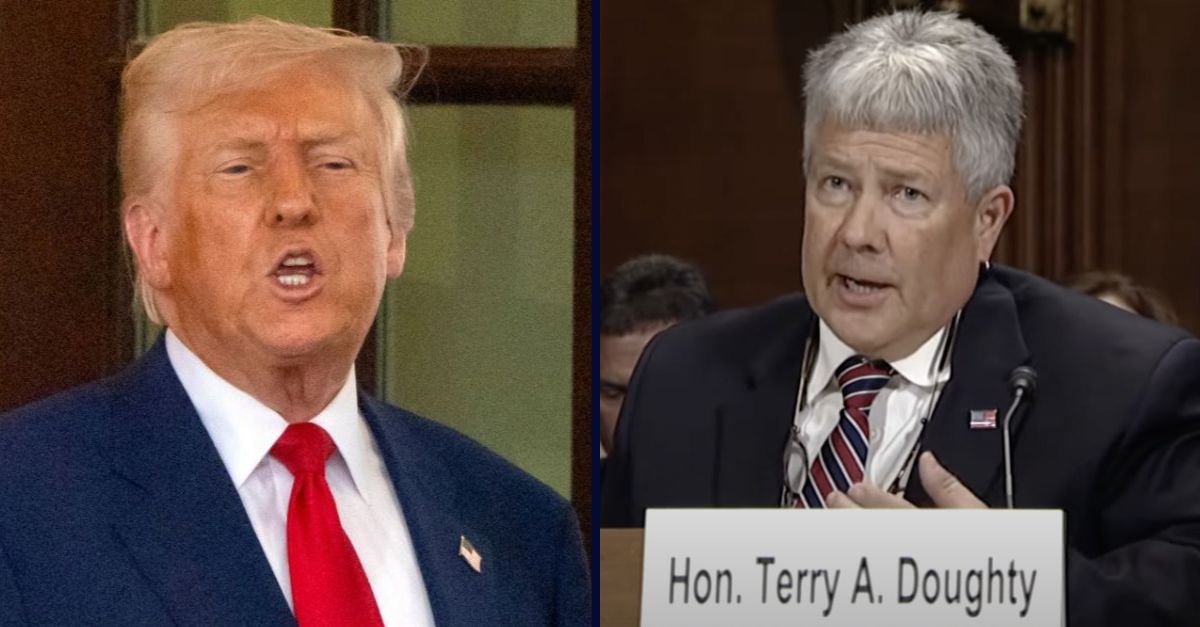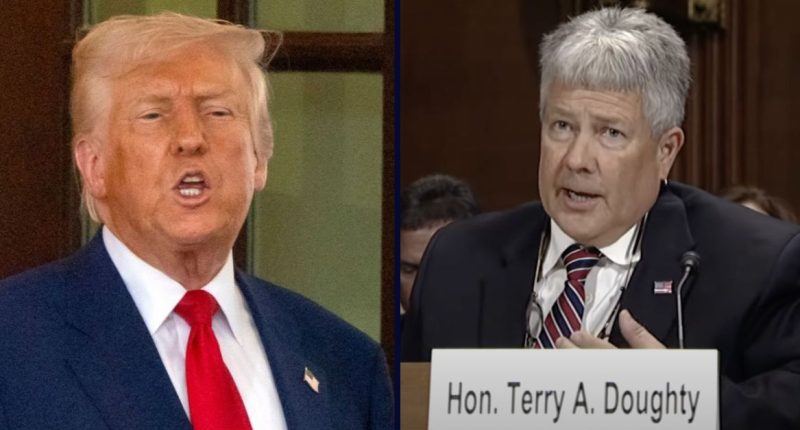
Left: Donald Trump leaving the West Wing of the White House, Monday, April 7, 2025, in Washington (AP Photo/Mark Schiefelbein). Right: U.S. District Judge Terry A. Doughty (YouTube/Sen. Bill Cassidy).
A federal judge in Louisiana known for his rulings that tend to align with causes championed by Donald Trump says that the president’s administration may have deported a 2-year-old girl who is a U.S. citizen, and has ordered the government to explain itself.
U.S. District Judge Terry Doughty, appointed by Trump in 2018, issued a memorandum order Friday setting a hearing to address the apparent deportation of a 2-year-old identified only as V.M.L. According to a petition for a writ of habeas corpus, or a request that court determine whether a person’s detention is unlawful, V.M.L. was born in 2023 in Baton Rouge, as indicated on her birth certificate.
A representative “next friend” of the child, who says she has known her since birth, also filed a motion for a temporary restraining order (TRO) to block the child’s removal, accusing Immigration and Customs Enforcement (ICE) of engaging in “attempts to disappear” V.M.L., and lying to the child’s family and representatives in the process. At the time the TRO motion was filed, the girl’s representatives believed she was still in the U.S.
In its opposition to the TRO request, ICE said that the girl’s mother wanted to take V.M.L. with her back to Honduras, and provided as proof a note written by hand in Spanish. The government also signaled skepticism that the child’s “next friend” Trish Mack, as well as V.M.L.’s father, were indeed who they said they were, saying they have not provided identification to ICE in support of releasing the child into their custody.
In Friday’s order, Doughty — who has reportedly been so popular among conservative litigants and lawyers that they have reportedly filed cases in his district in hopes of landing before him, according to Politico — appeared to simultaneously give the government the benefit of the doubt while also reminding DOJ lawyers that U.S. citizens cannot be deported.
“VML is ostensibly a two-year-old United States citizen,” the judge wrote (citations omitted). “On April 24, 2025, this Court received a Petition contending that VML was being deported, alongside her illegal-immigrant mother, to Honduras. Of course, ‘It is illegal and unconstitutional to deport, detain for deportation, or recommend deportation of a U.S. citizen.””
The judge said in his memo that the handwritten note provided by the government as proof that ICE was doing what V.M.L.’s mother wanted was simply not enough.
“The Government contends that this is all okay because the mother wishes that the child be deported with her,” the judge wrote. “But the Court doesn’t know that.”
Doughty acknowledged that as the matter was escalating, he reached out to the government himself.
From the memo (citations omitted):
Seeking the path of least resistance, the Court called counsel for the Government at 12:19 p.m. CST, so that we could speak with VML’s mother and survey her consent and custodial rights. The Court was independently aware at the time that the plane, tail number N570TA, was above the Gulf of America. The Court was then called back by counsel for the Government at 1:06 p.m. CST, informing the Court that a call with VML’s mother would not be possible, because she (and presumably VML) had just been released in Honduras.
In his conclusion, the judge appears to have maintained his expectation and hope that the government had not, in fact, violated the fundamental principle that a U.S. citizen must not be deported.
“In the interest of dispelling our strong suspicion that the Government just deported a U.S. citizen with no meaningful process, it is ordered that the matter be set for hearing at 9:00 a.m. on May 16, 2025,” Doughty wrote.
Doughty’s acknowledgment of the “Gulf of America” appears to signal his acceptance of Trump’s February proclamation and January executive order claiming that the body of water between the eastern coast of Mexico, the northwest coast of Cuba, and the southern states of Texas, Louisiana, Mississippi, Alabama and Florida would no longer be recognized by the U.S. as the Gulf of Mexico, a name it has held since the 1500s.
That move sparked a fight between the White House and The Associated Press that ultimately resulted in the news organization getting kicked out of the White House press pool for refusing to alter how it would refer to the maritime zone.
Love true crime? Sign up for our newsletter, The Law&Crime Docket, to get the latest real-life crime stories delivered right to your inbox.




